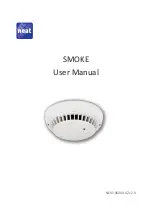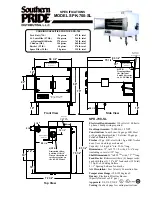
1
UM-EN_LAN-WMBUS-SMK2 REV1.2
UM-EN_LAN-WMBUS-SMK2 REV1.2
INTRODUCTION
LANSEN
’s advanced single station photoelectric smoke detector
SMK2 series is designed to sense smoke that comes into the
sensing chamber. It does not sense gas or flame. This smoke
detector is designed to give early warning of developing fires by
giving sound alarm from its built-in alarm horn. It can provide
precious time for you and your family to escape before a fire
spread. However, the smoke detector only makes such pre-warning of fire
accident possible if the smoke detector is located, installed, and
maintained properly as described in this manual.
In addition, this smoke detector also integrates a high-
performance radio transmitter that sends status messages via the
Wireless M-BUS & OMS (Open Metering Standard) protocol. The
integrated radio module is only used for monitoring and transmitting
of the performance and functionality of the smoke detector.
OVERVIEW
Model
LAN-WMBUS-SMK2 series
Power source for radio
communication
Panasonic CR123A or
Duracell DL123A 3V lithium battery
(Replaceable)
Battery lifetime
More than ten (10) years
Power source for
smoke detection
Energizer L91 lithium battery
(NOT replaceable)
Battery lifetime
More than ten (10) years
PRODUCT CHARACTERISTICS
Main function
Smoke detector
Sensitivity standard
EN14604
Method of mounting
Ceiling
Alarm audibility
Over 85 dB/3m
Interconnectable
No (Single station)
RF communication
868.95 MHz
Indicator
Alarm
Red LED flashing 3 times and horn
emit 3 tones every 4 second
Malfunction
Yellow LED flashing every 48 second
Power
Green LED flashing every 48 second
Temporary
deactivation facility
No
Temporary muting
facility
Silence alarm about eight minutes
Silence malfunction (error) about one hour
Operation
temperature
0ºC~50ºC (32ºF~122ºF)
Relative Humidity
5~90%
Size
120mm diameter x 52.45mm depth
WARNING:
This smoke detector is designed for use in a single
residential unit only, which means it should only be used inside a
single-family apartment or home. The detectors are stand-alone units and
have no interconnections to other smoke detectors.
WARNING:
This detector must not be used in non-residential buildings.
Warehouses, industrial or commercial buildings, and special purpose
non-residential buildings require special fire detection and alarm systems.
This smoke detector alone is not a suitable substitute for complete fire
detection systems for places where many people live or work, such as
hotels or motels. The same is true of dormitories, hospitals, nursing homes
or group homes of any kind, even if they were once single-family homes.
WARNING:
This smoke detector will not alert people who are hard of
hearing. It is strongly recommended that special-purpose smoke detectors,
using lights or vibrating devices, should be installed to alert occupants who
are hard of hearing.
LOCATIONS TO INSTALL YOUR SMOKE DETECTORS
For complete coverage in residential units, smoke detectors should be
installed in all rooms, halls, storage areas, basements, and attics in each
family living unit. Minimum coverage is one detector on each floor and one
in each sleeping area.
Useful tips:
˙
Install one separate smoke detector in every bedroom and one smoke
detector on each floor as a minimum protection. Install a separate
smoke detector in each separate room and exit way except kitchen, as
shown in
Figure 1
and
Figure 2
.
˙
Install a smoke detector on every floor of a multi-floor home or
apartment, as shown in
Figure 3
.
˙
Install a minimum of two detectors in any household.
˙
Install a smoke detector inside every bedroom.
˙
Install smoke detectors at both ends of a bedroom hallway if the hallway
is more than 40 feet (12 meters) long.
˙
Install basement smoke detector at the bottom of basement stairwell.
˙
Install second-floor smoke detectors at the top of the first-to-second
floor stairwell.
Be sure no door or other obstruction blocks the path
of smoke to the smoke detector.
˙
Install additional smoke detectors in your living room, dining room,
family room, attic, utility and storage rooms.
˙
Install smoke detectors as close to the center of the ceiling as possible.
If this is not practical, put the detector on the ceiling, no closer than 20
inches (50 cm) from any wall or corner, as shown in
Figure 4
.
˙
If ceiling mounting is not possible and if wall mounting is permitted by
your local and state codes, put wall-mounted detectors between 4 and 6
inches (10 ~ 15 cm) from the ceiling, as seen in
Figure 4
.
˙
If some of your rooms have sloped, peaked, or gabled ceilings (>20°)
then the distance between the peak and the mounting point of the
smoke detector shall be 0.5
– 1 m, measured along the peaked ceiling
as shown in
Figure 5
.
Figure 1
:
ONE SEPARATE SMOKE DETECTOR
IN EVERY BEDROOM AND ONE
SMOKE DETECTOR ON EACH FLOOR
(IF MULTI-LEVEL BUILDING) FOR
MINIMUM SECURITY.
Figure 2
:
ONE SEPARATE SMOKE
DETECTOR IN EVERY ROOM,
EXCEPT KITCHEN AND
BATHROOM FOR MORE
SECURITY
LONG BATTERY LIFE SINGLE STATION
RF & BATTERY POWERED
PHOTOELETRIC SMOKE DETECTOR
SMK2 SERIES
USER’S MANUAL
Figure 3
:
LOCATION FOR PLACING SMOKE
DETECTOR FOR A MULTI-FLOOR
RESIDENCE






















